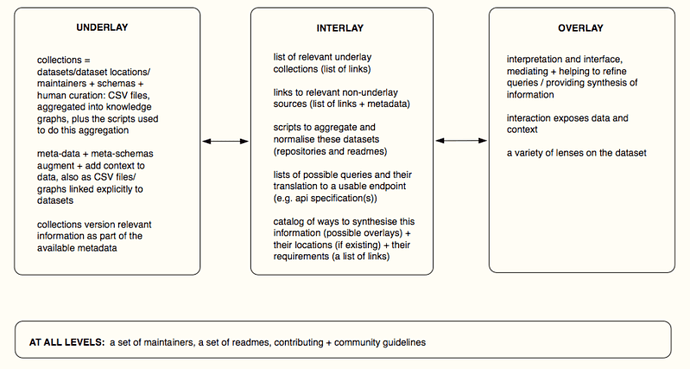Here’s another FedWiki page that explains more about how it works, and what the relationship is to ‘commoning’ by Silke Helfrich
I agree wikis are important and federation across wikis too. Sorry, I’m not able to easily imagine what the characteristics of a system of wikis might be, built under an #activitypub protocol. That would be quite a thought experiment - worth doing properly I’d say. But I can try to outline the important characteristics of federated wiki imho. Aka ‘wiki’.
In contrast with wiki(pedia), wiki is for individual rather than collective authorship/ownership. The pages or paragraphs of a wiki site can be forked without limit within the wiki community. Ward Cunningham (wiki creator/guru) calls this ‘a chorus of voices’ in contrast with the wiki-for-consensus that most people are familiar with.
wiki has affordances that enable a community to form around (using) the members’ own wikis, and publish work to each other with an intention to collectively evolve an understanding or a body of content, in wiki. This is sometimes called ‘podding’. A parallel (sync or async) communication channel is needed too - messaging, email, videoconferencing, etc.
wiki has affordances for observing what other known writers have been at work on (signified by page edits) and for constructing a ‘neighborhood’ of sites containing resources believed to be useful in the context of the present wiki. Within the neighborhood, free-text search is available. Any found page (or paragraph within it) can be forked to the present wiki. Thus wiki is ‘an awareness engine’.
wiki is profoundly hypertextual - not only links across and within sites but also endless forking of content and versioning of pages. A page maintains a complete version history, including sources of content. Hyperspatiality makes ‘wiki space’ hard for many folks to navigate in. A feature of wiki UI is narrow pages laid side-by-side in the window. This helps in flattening hyperspace. But this is also confusing for many folks used to multiple browser tabs
wiki comes out of the Smalltalk community. Its original programmer Ward Cunningham also programmd the first wikipedia-type wiki (called ‘wiki wiki’). wiki is an attempt by Ward, 30 years later, to provide tools for creative authorship and active making, rather than librarianship and the authority of professional fields. In this regard it may be closer to Tiddlywiki for example (eg used for personal notebooks) than to wikipedia.
Coming from Smalltalk (and, say, Hypercard), and from Ward as an ace creative programmer/problem-solver, wiki includes affordances for computation within the page, across pages in a wiki site, across sites in a farm (a server) and across servers in the wikiverse. wiki is absolutely not just a text engine, it’s a federal computing environment.
Significant 2021 innovations from wiki’s geeky core community include plugins that do computation from data on a site’s pages; also drawing visual maps of relationships within a web of linked pages (and other graph applications); also organising data harvested in large-scale geographical spaces. The tooling capability of wiki is enormous. Again this makes it harder for ‘simple’ users to really mobilise the power. But to ‘get it’, readers must be writers.
TBH the wiki community is pretty geeky, largely comprising sysadmins who self-host farms. Experiments are only just beginning, in creating hosted wiki farms for non-geeks to use in a routine, ‘vernacular’, SaaS kind of way - as personal notebooks say, or as vehicles for explicit federating across a community of collaborating co-makers (eg community organisers, educators, coop development folks, activist networks, designers).
FYI my wikis can be found from this page of ‘rosters’: Rosters
Another listing is here: What goes on
Some are work-in-progress. Some are scrapbooks. Some are resource catalogues to support projects. Some are drafts of books. Some are thought spaces for reflecting on issues (components of a digital toolstack for organisers, the institutional labour of activist education aka formaciòn, ‘making the living economy’).
My own collection of howtowiki links is here: wiki literacy
I surely have missed some features, might tweak this series if a conversation develops.
I feel wiki is a very serious collaborative text-based environment; also a serious distributed computing environment. Intrinsic complexity makes it puzzling for many folks. This kind of issue is only just being engaged in the wiki core community, with a view to making wiki a space of vernacular tools for conviviality.
![]()

